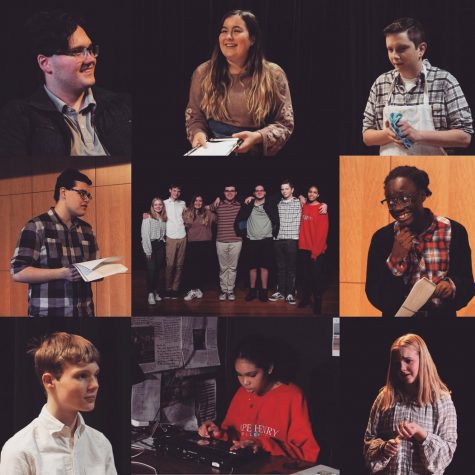Third Culture Kids: Who are they?
A look into the unique lives of the children of global nomads
Third Culture Kids have always existed, but it’s only recently that a larger part of society has begun to learn about their lifestyles and how they are different from the rest of the world. From an outside perspective, their lives can seem extravagant, full of unique opportunities and experiences; like they’ve lived lives most adults could only dream of. But what most people don’t know is that Third Culture Kids, while unique in their own ways, can also struggle developmentally and with their sense of identity and belonging.
Third Culture Kids, or TCKs, are the children of international business people, diplomats, the military, missionaries, global educators, or anyone with a job that causes them to relocate their family overseas. They lead lives filled with travel, exposure to various languages and cultures, and often, abnormal amounts of change. They spend their formative years in nations different from those their parents grew up in, countries they may originate from, or countries where they hold passports. Every situation is different, and often TCKs hold multiple passports and can speak different languages in a choppy, semi-conversational way. They are often passive bilinguals to languages native to the countries they stay in after being exposed to them for extended periods of time and needing a rudimentary understanding to get by. The name for them comes from the mixture of exposure to their parents’ cultures, their host culture in the country they are living in, and a mix of other cultures they are exposed to, whether at school, after multiple moves, or in the general expatriate community.
There are many well known Third Culture Kids, including Freddie Mercury, Kim Jong Un, and former President Barack Obama. All three of these individuals formed some period of their formative years in cultures and nations which differed from those they were born in or their parents originated from. Freddie Mercury was born in Tanzania to Parsi parents and lived there before spending his middle and high school years in Mumbai. He moved to England to be with his family at age 17, where he later joined Queen. His unique background enabled him to have a different view of the world around him than the rest of his band mates, making the music he produced distinctive. Barack Obama’s childhood was similar; born in Hawaii to an American mother and Kenyan father, he moved to Indonesia at a young age for a few years to live with his stepfather before moving back to Hawaii, and eventually, Chicago. He attended Ivy League universities and had a successful career in law and politics prior to being elected the President of the United States, showing that the positive effect of being a TCK on leadership abilities really is incredible. Something similar is seen in Kim Jong Un, who was educated in Bern, Switzerland until he was 15 years old. He later returned to North Korea, where he became dictator, another leadership post a TCK would have the unique ability to fulfill. All of these individuals are proof of how globally oriented Third Culture Kids are, often earning jobs in leadership positions that entail frequent travel.
The benefits of being a TCK are plentiful when it comes to hiring, education, and their success in the post-educational world. They are exceptionally open-minded, given that they have had to move so often and adjust to so many new cultures. They are highly adaptive, and they can cross cultures excellently and with ease, making them exceptional hires because of their interpersonal and intercultural skills and their unique outlook on the world. Their education shows that they are driven, high achieving, and quite often, incredibly intelligent and talented. Third Culture Kids are four times more likely to earn a Bachelor’s Degree than the average student and typically end up majoring in International Relations, Social Sciences, or a business or science-related degree, according to a study conducted by the University of Arkansas, Fayetteville.
However, being a Third Culture Kids comes with its challenges. They are more likely to experience prolonged adolescence and issues relating to their ethnic group, having been around people who are so different from them for extended periods of time. According to David C. Pollock and Ruth E. Van Reken, authors of Third Culture Kids: Growing Up Among Worlds, TCKs struggle with development and identity. They never truly know who they are: they only know who they are within the constraints of a given country or school. Some children develop new names and identities for each new place as a coping mechanism, something which can be a luxury in some cases and a detriment in others.
Additionally, once a child moves a certain number of times, they begin to grieve the places and cultures they are leaving, and who they had become in that environment, more so than the people they met and formed bonds with. Moving on to a new adventure never gets easier for TCKs, they just get used to it. Because they are constantly being uprooted, they have difficulty forming deep and long-lasting relationships and can struggle with a fear of commitment. For them, the better the friendship, the more pain they will feel when they inevitably leave.
Rebecca Grappo, an educational consultant who specializes in the placement of TCKs, says that there are three key things children need: connection, recognition, and belonging. All three of these things are taken away from Third Culture Kids with every move, and they are completely powerless in the decision to relocate.
Katie Patterson, a TCK currently living in the United States, says that for her, moving never gets any easier. Every move brings a lot of pain, and if she stays somewhere for more than two years, she gets afraid of how terribly it will hurt when she ultimately has to say goodbye. She says that she has to “put on a smile, pack the bags, and get ready for the next place. Now it’s at the point where if I stay somewhere a little longer than usual, I don’t know how to feel, I get stir crazy.” Katie, who has lived in Taiwan, Chile, Belgium, South Africa, India, and the United States for her parents’ jobs as global educators, is not the only TCK who experiences the stir craziness that can come with staying in a particular country for longer than usual.
There is, however, another perspective. Anika Shah is a United States citizen who has lived in Mumbai, India for 15 years of her life. She attended the American School of Bombay until this year when she moved to London to attend boarding school. Having attended an international school for so long, Anika has made countless friends who have come and gone on a yearly basis. For Anika, it never gets easier “to make friends during the school year and have to say goodbye to so many of them at the end of the year. It can be discouraging to know [she has] to start over again at the start of every year, and every time [she starts] to get close to people [she asks] them how long they’ll be staying. [She has] lost friendships because [she] didn’t want to feel the pain of saying goodbye to really important people in [her] life. [She’s] definitely used to it, but it never ever gets easier.”
International schools are phenomena in themselves. An international school is a school that caters to the needs of children who are not nationals of the host country. For the most part, this includes the children of international business people, diplomats, military families, or global educators. They tend to offer an IB curriculum or International General Certificate of Secondary Education (IGCSE). These curricula are made specifically for international schools and their overwhelming number of Third Culture students, making the students who graduate from or attend these schools unique in terms of their educational background, as well. The IB, or International Baccalaureate and IGCSE curricula are different from curricula specific to individual nations, like the AP or GCSE curriculum native to the United States or Britain. These systems provide a far more global outlook on the world and education, meaning classes like American or British history are not staples in these systems like they would be in those nations. Instead, students learn topics like history from a more global perspective, often spending more time on the history of their school’s host country. These curricula are specifically designed to apply to students who may be attending public schools in a multitude of countries across the globe, so the systems have to allow students to transition as smoothly as possible between education systems.
It is very common for TCKs to return to their country of origin after an assignment, which can exacerbate issues with identity. TCKs are all over the world, not just in international schools. They can be in public schools in America or local schools in France, you just have to find them. There are very few authentic International Schools in Virginia, if any, and often international students studying in the United States will attend a normal American school, given that many international schools abroad are the result of consulates or embassies in the region.
The American School of Bombay, for example, was formed after a daycare for the children of US Consulate employees became overwhelmed with kids. As a result, ASB was born and has since expanded to three campuses across Mumbai for different age groups. It is an international school giant and is well-known across the community of global educators, employees, and students as a leader in globally-oriented education. Schools like ASB are a host for educators from a plethora of nations and backgrounds, expatriate parents, and of course, Third Culture Kids. Superintendent Craig Johnson said in an interview for a spotlight on the school with India’s CNBC-TV18 that the school is a “microcosm of the world.”
The Third Culture Kid community is made up of more than 200 million people across the globe and is not a group many people know much about. They lead unique lives and make up a large portion of current and future world leaders, in politics, business, science, music, and so much more. Being a TCK myself, I know from experience how being a part of the community can have both positive and negative effects on a person. It is confusing, however, Third Culture Kids would not be who they are without the crazy experiences and adventures that make up their childhood. They wouldn’t be who they are without all the moving, the friends across the globe, or the multiple passports. They experience a lot of pain with all the change, but the result is a sense of resilience and of adaptability like no other.
The painstaking yet common question for Third Culture Kids, “Where are you from?” will always be impossible to answer, at least not in a way similar to the way the majority of people would answer. Third Culture Kids are not from where they hold a passport or where they were born, or even where they lived the longest. They are from where they feel as if they are a local. Being a TCK is confusing, difficult, painful, exhilarating, addictive, and incredibly fun. It is truly one of the most unique groups in the world, and despite the opinion of many people around the world that their lives are filled with adventure and incredible opportunities, to TCKs, this life is all they know. To Third Culture Kids, what many people could only dream of doing, even in their adult lives, is just life. The world truly is their oyster, and they will only continue to take it by storm.


